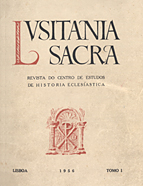

................................
The pioneering work of scholars such as Jean Daniélou and Henri-Irénée Marrou, particularly their
Nouvelle Histoire de L'Église, and Hubert Jedin’s contributions, among others, provided a new framework for understanding religious history. This framework, adopted by the CISH, emphasised the complexity of religious issues and established them as an essential historiographical field, extending beyond the ecclesiastical, institutional, and confessional focus that characterised LS during its early years. While the promoters of LS strove for scientific rigour and "impartiality" [ LS , 1st Series (1956), p. 11], their efforts coexisted with an apologetic perspective. This perspective sought to highlight the Catholic Church's role in Portugal's historical consolidation, reflecting the national Catholicism that influenced some of the project's most prominent advocates. These characteristics are reflected in the predominance of articles addressing the Mediaeval and Modern periods, with very few devoted to contemporary times. LS did not diverge significantly from the broader landscape of contemporary Portuguese historiography. The publication as a whole adhered to traditional ecclesiastical history, primarily focusing on an institutional approach to religious phenomena. This focus included analyses of ecclesiastical structures (A. Antunes Borges– Provisão dos Bispados e Concílio Nacional no Reinado de D. João IV [Provision of the Bishoprics and National Council in the Reign of King João IV]; António Brásio– Três Dioceses Pombalinas: Castelo Branco, Penafiel, Pinhel [Three Pombaline Dioceses: Castelo Branco, Penafiel, Pinhel]) and leadership (Manuel Maria Wermers– D. Fr. Baltasar Limpo no Concílio de Trento ), [ Baltasar Limpo at the Council of Trent ]). It also highlighted national contributions to significant ecclesiastical events, such as Celestino Pires’s Os Teólogos portugueses e a graça no Concílio de Trento [Portuguese theologians and grace at the Council of Trent]), all presented from a Catholic perspective.
This work is financed by national funds through FCT - Foundation for Science and Technology, I.P, in the scope of the projects UIDB/04311/2020 and UIDP/04311/2020.
